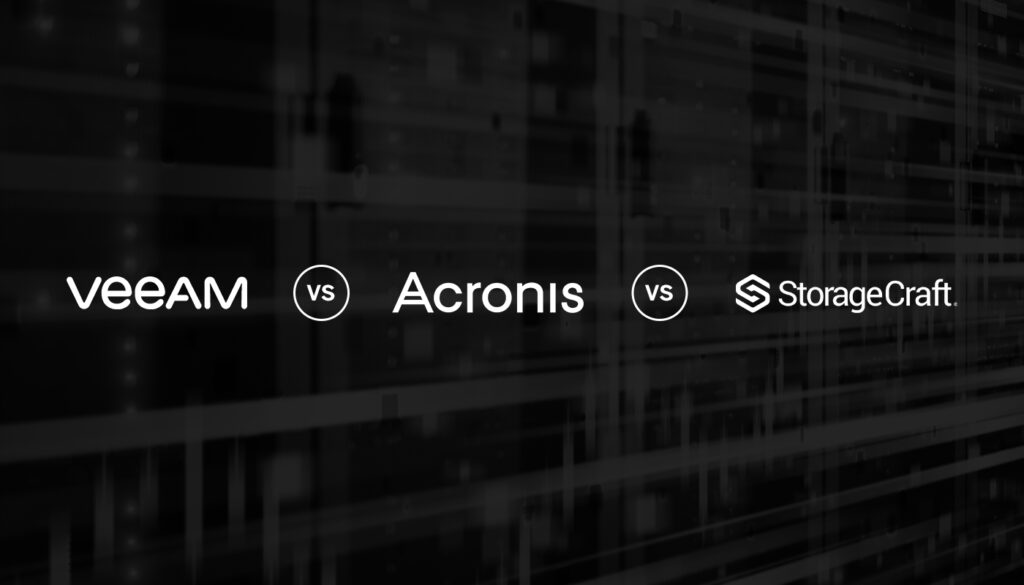Backups are not optional. In a business environment where 60% of small companies close permanently within six months of experiencing a significant data loss, leaving your critical digital assets without robust backups is playing with fire.
At the same token, smaller organizations with limited resources have to be strategic about the vendors and solutions they select to achieve the important goal of secure, reliable, and accessible backups.
For SMBs, there are a number of good options. Three of the best come from Veeam, Acronis, and StorageCraft, with feature sets and licensing options tailored to SMB workflows and needs.
Commonalities and Differences
The naming systems can change and there are subtle differences in operation, but all three generally offer the following:
- Notification via email of updates and errors
- Automatic retry should an error occur during a backup
- Variable file compression (to save storage space)
- Pre- and post-backup command scripts
Some popular features are less common, however, and may be optional or unavailable. For example, Acronis does not have the ability to throttle bandwidth and memory usage (which is useful during periods of spotty connectivity), it cannot change the size of the uploaded file chunks, or alter the number of threads running to prioritize or deprioritize certain backup tasks.
StorageCraft can perform throttling, and it has a few other features the other two solutions lack, including:
- Splitting images into smaller volumes
- Retention of previous images
It can also enable retention of full backups or deletion of incremental copies at the administrator’s option, which is a feature also native to Veeam when using GFS (Grandfather-Father-Son) to keep archival full backups (e.g keep a year’s worth of monthly backups, a month’s worth of weekly backups, etc).
Of the three, only Veeam supports completely granular control over backup, allowing administrators to turn on or off backups for individual files or folders with ease.
Security
Though all three offer some form of encryption to prevent backup data from being viewable by unauthorized users, they offer slightly different options and protection solutions.
Veeam uses 256-bit AES (Advanced Encryption Standard), which is among the strongest options available for SMBs. Acronis also relies on AES but permits the administrator to select between 128-, 192-, and 256-bit encryption. However, it lacks support for a Key Management Service (KMS), which are third party solutions for creating, tracking, and validating cryptographic keys.
StorageCraft can be configured to encrypt backup data with either 128- or 256-bit AES or with a different standard, RC4, which is not as secure but enables far greater transfer speeds — a tradeoff, it should be noted, that is not recommended for most SMBs.
Virtual and Physical Servers
Veeam was originally designed specially for backing up VMware virtual machines, and has more features useful to organizations that are virtualizing large numbers of systems. It collects information about all virtual machines via a hypervisor (hardware or software that creates and manages virtual machines).
For backing up physical servers, Veeam relies on an agent-based approach, an applet that runs on each physical system. The advantage of using an agent is that the backup process and the target data are closely linked and there is no need for extensive external resources to manage the process. It provides highly granular control and robust integrations. For example, it enables the coordination of backup tasks with other applications on the system, and Veeam is application aware, meaning it backs up application data (e.g. Active Directory objects and SQL transaction logs).
Agentless backup solutions, by contrast, are stored on external servers, physically separated from the system or systems being recorded. The advantage of that approach is easier and more centralized management. One configuration can be applied to numerous systems.
Veeam also requires an agent for backing up virtual machines in a public cloud (if access to a hypervisor is limited), whereas both Acronis and StorageCraft are agent-based for both physical and virtual servers.
Cloud Options
Veeam does not provide their own private cloud storage, but offers cloud storage from approved Veeam Cloud & Service Provider Partners (VCSP) like D2. Acronis and StorageCraft, however, do offer private cloud storage for backups on server clusters they manage.
Though it relies on a browser-based console, you still need to download its software to use Acronis’ backup solution. Also, although it has some third party cloud storage integrations, they are few in number and have some limitations; hence, most users are restricted to using their proprietary cloud.
Dedicated Hardware for Software Engines
Both Veeam and StorageCraft require a dedicated backup server or service node to orchestrate backups. That server functions as the agent facilitating operations directly on the backup target. The benefit of this solution is that the machine being backed up does not lose functionality or processing power during backup operations. Of note, however, that only applies to virtual machine backups. When backing up a physical server, the agent will use some of that machine’s CPU/memory to facilitate the backup process.
Acronis is completely agent-based, so there is no hardware needed, just a software engine contained within the agent. The downside to that approach is that the backup target has to provide the computing power to back itself up, which slows down the process.
Conclusion
We live in a data-driven economy. No business, whether a giant enterprise or a nimble SMB, can afford to go without simple, effective, affordable, and provably reliable backup solutions.
After weighing the costs, features, security posture, and ease of management associated with all the major players, we at D2 have determined that, for most SMBs, Veeam offers the best balance of price to performance. Because every SMB and every operation is different, however, the optimal solution has to be determined on a case-by-case basis.
Need guidance and support for managing your critical backup operations? Talk to the IT pros at D2.
